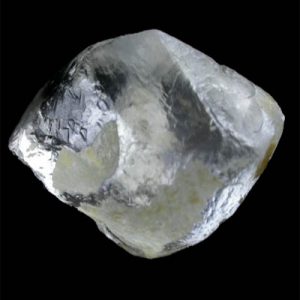Gaylussite
Gaylussite is a relatively rare mineral but a very rare gem. It is one of several carbonate minerals that form in non-marine evaporite deposits. These carbonates include Trona, Pirssonite, Nahcolite, Northupite and Thermonatrite and are difficult to tell apart from each other. Optical or X-ray techniques are often necessary to identify them. Gaylussite is subject to dehydration which can cause cloudiness of gems and deterioration and therefore should be stored in a sealed container.
Notable occurrences include Searles Lake, San Berardino County; Deep Spring and Owens Lake, Inyo County; Borax Lake, Lake County and China Lake, Kern County, California, USA; Gobi Desert, Mongolia and Lagunillas, Merida, Venezuela.
| Category: | Carbonate mineral |
| Chemical Formula: | Na2Ca(CO3)2·5(H2O) |
| Hydrated Sodium Calcium Carbonate | |
| Molecular Weight: | 296.15 gm |
| Composition: | Sodium | 15.53 % | Na | 20.93 % | Na2O |
| Calcium | 13.53 % | Ca | 18.94 % | CaO | |
| Hydrogen | 3.40 % | H | 30.42 % | H2O | |
| Carbon | 8.11 % | C | 29.72 % | CO2 | |
| Oxygen | 59.43 % | O | |||
| 100.00 % | 100.00 % | = TOTAL OXIDE |
| Crystallography: | Monoclinic – Prismatic |
| Crystal Habit: | Includes intricately faceted prismatic to tabular crystals, but also massive and encrusting. Crystals frequently elongated [100]; also flattened, wedge-shaped, with dominant [110], and [011]. Surfaces commonly rough, with [011] striated [111]. |
| Twinning: | None |
| Cleavage: | [110] Perfect, [001] Imperfect |
| Fracture: | Conchoidal |
| Tenacity: | Very Brittle |
| Moh’s Hardness: | 2.5 – 3.0 |
| Density: | 1.93 – 1.99 (g/cm3) |
| Luminescence: | None |
| Radioactivity: | Not Radioactive |
| Other: | Dehydrates slowly with efflorescence in dry air; slowly decomposes in water leaving CaCO3 as Calcite or Aragonite. Soluble in acids with effervescence. Slightly soluble in water. Alters readily to calcite. |
| Color: | Colourless, Yellowish, Greyish, White; Colourless in transmitted light. |
| Transparency: | Transparent to Translucent |
| Luster: | Vitreous |
| Refractive Index: | 1.444 – 1.523 Biaxial ( – ) |
| Birefringence: | 0.0790 |
| Dispersion: | Strong; r < v |
| Pleochroism: | None |


